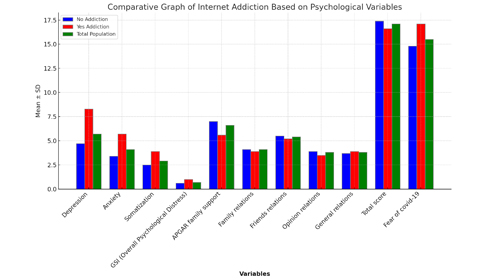
Internet Addiction Growing Among Iranian University Students Showing: Study
In what could serve as an eye opener, a new study published in Health Science Reports has raised concerns about the increasing frequency of internet addiction among university students, especially during the COVID-19 epidemic. The Department of Psychiatry at Iran's Babol University of Medical Sciences conducted the study, which illuminates the risk factors associated with internet addiction and its extensive impact on social, interpersonal, psychological, and physical health.
The university's Health Research Institute led the study, which polled 318 students using five different questionnaires to assess internet addiction and associated risk factors. The study collected data between August and September 2021, painting a picture of the situation at the peak of the pandemic.
The study discovered that internet addiction was prevalent in 28.9% of the students polled. Women had a higher prevalence (33.5%) than men (22%), which was statistically significant. Furthermore, individuals pursuing doctoral degrees had a higher prevalence of internet addiction (32.9%) than those obtaining a Bachelor of Science degree (23.5%).
However, certain demographic characteristics, such as age, marital status, and place of residence (dormitory vs. private housing), did not significantly affect the prevalence of internet addiction. Similarly, the absence of alcohol or cigarette use as a risk factor suggests a greater importance of psychological and emotional factors in internet addiction.
The study found a strong link between internet addiction and mental health problems. Students who showed signs of depression, anxiety, or physical symptoms related to stress were much more likely to struggle with internet addiction. The Brief Symptom Inventory 18 showed that students with internet addiction scored higher in depression (8.3 vs. 4.7), anxiety (5.7 vs. 3.4), and overall distress (1.0 vs. 0.6).
The APGAR family support scale, which is family support scale is used to measure a person's satisfaction with the support they receive from their family. It assesses five components of family support: Adaptation (how well the family adapts to stress), Partnership (family participation in decision-making), Growth (emotional growth and maturity of family members), Affection (love and emotional closeness), and Resolve (commitment to shared goals). The scale is used to understand the quality of family support, with higher scores indicating stronger family functioning. It showed that stronger family support helped protect against internet addiction. Students with higher family support scores (7.0) had lower rates of addiction compared to those with lower scores (5.6).Risk factors included fear of COVID-19 and a family history of mental illness. The study highlighted that students who feared COVID-19 were more likely to develop internet addiction (17.1 vs. 14.8). Additionally, students with a family history of mental illness were at significantly higher risk, emphasizing the importance of addressing pre-existing mental health issues in preventing internet addiction.
The study further found that, Medical students were disproportionately affected, with the heavy demands of medical studies, combined with the pandemic's uncertainty, most certainly increased their reliance on the internet for coping and connection, making them more susceptible to addiction.
The findings from Iran reflect growing global worries about internet addiction, particularly among young adults and university students. Countries with similar socio-cultural characteristics, particularly those with a strong emphasis on academic accomplishment and extensive internet use, may confront similar issues. The COVID-19 pandemic has increased dependency on digital platforms for education, social connection, and entertainment, adding to the rise of internet addiction cases.
Nations with strong internet usage and academic pressures, such as India, South Korea, and China, have documented similar addiction trends. The pandemic's emotional toll, such as worry, isolation, and dread of illness, is likely to have exacerbated these patterns, posing serious threats to young adults' mental health.
The study emphasises the urgent need for preventive measures to combat internet addiction. Early detection of pupils at risk, particularly those with pre-existing mental health disorders or heightened COVID-19 worries, is critical. Universities should consider incorporating mental health support services, encouraging family involvement, and educating students about the dangers of excessive internet use.
The study's authors conclude that "internet addiction is a serious issue that requires immediate attention, especially among students in the medical field." To mitigate the long-term psychological and societal consequences of this escalating catastrophe, educational institutions, mental health specialists, and governments will need to work together.
Internet addiction is more than just a personal or technological problem; it is a public health issue with far-reaching implications. As this Iranian study demonstrates, the psychological, emotional, and social consequences of internet addiction are severe, particularly among university students. With the frequency of internet addiction increasing, immediate action is required to preserve the mental health of kids globally.
In countries with similar socioeconomic conditions, the findings of this study should act as a wake-up call to address the digital divide between healthy internet use and addiction.